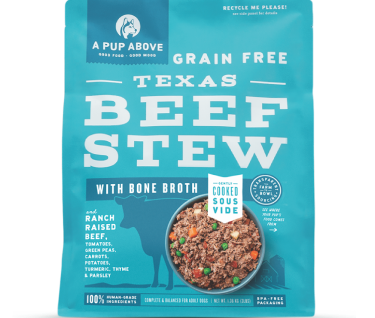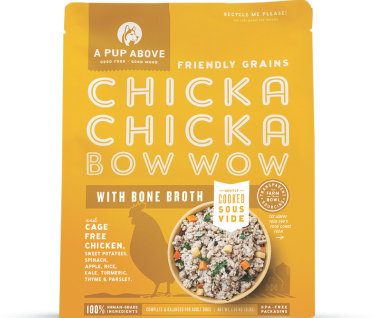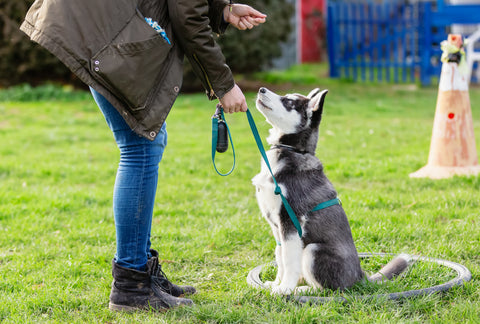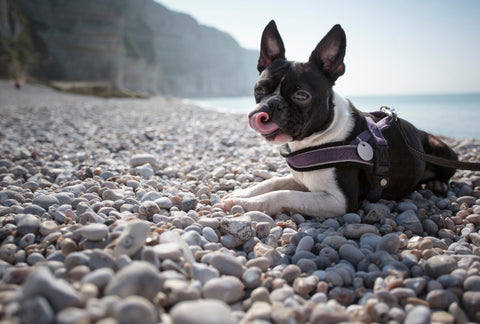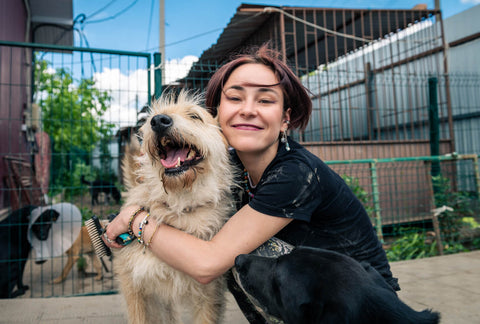
In the whimsical world of dog behaviors, there's one quirk that often puzzles pet parents: reverse sneezing. This phenomenon, while odd sounding, is usually harmless and quite common among dogs.
Let’s look at what reverse sneezing is, demystify its causes, and offer insights to help you understand this peculiar canine behavior. Our goal is to provide you with information and peace of mind so you can continue caring for your pup with confidence and a bit of newfound knowledge.
What Is Reverse Sneezing?
Reverse sneezing in dogs, also known as pharyngeal gag reflex, is a curious and often misunderstood occurrence.
Let's break it down:
Understanding the Mechanism
During a reverse sneezing episode, a dog rapidly inhales air through the nose, resulting in a distinctive snorting or honking sound. This is caused by a spasm of the soft palate and throat, which can be triggered by irritation or mild inflammation.
The Visuals and Sounds
It might look alarming at first, with your dog standing still, extending their neck, and making loud, dramatic snorting sounds. Some dogs might even appear momentarily distressed or confused.
Duration and Frequency
Episodes are typically short-lived, lasting from a few seconds to a minute. The frequency can vary widely among dogs, with some experiencing it infrequently and others more regularly.
Though it may sound severe, reverse sneezing is generally a harmless event. It's a bit like a sneeze in reverse — instead of expelling air out like in a regular sneeze, air is rapidly pulled in.
Why Do Dogs Experience Reverse Sneezing?
So, what triggers this peculiar reverse sneeze? A few common causes include:
- Environmental Irritants: Like humans, dogs can be sensitive to environmental irritants. Things like pollen, dust, smoke, or strong odors can irritate their nasal passages and throat, triggering a reverse sneezing episode.
- Excitement or Overexertion: Sometimes, sheer excitement or vigorous play can cause a dog to inhale abruptly, leading to reverse sneezing. Even a sudden change in temperature can set it off.
- Pulling on the Leash: Dogs that pull hard on their leashes or wear tight collars may experience pressure on their throat, which can lead to an episode of reverse sneezing.
- Allergies and Infections: Allergic reactions or respiratory infections can also be behind these sneezing fits. Inflammation from these conditions can make the throat more sensitive.
- Eating or Drinking Too Fast: Gobbling down food or water can sometimes cause a bout of reverse sneezing, as it may lead to a quick intake of air.
- Breed Specificity: Certain breeds, especially small dogs and brachycephalic breeds with shorter nasal passages are more prone to reverse sneezing due to their unique anatomical structure.
These examples can help you pinpoint what might be setting off your dog’s reverse sneezing, making it a bit less mysterious.
Is Reverse Sneezing a Sign of Something Serious?
Understanding when reverse sneezing in dogs might be a red flag is an essential part of caring for your furry friend. While this quirky behavior is typically harmless, it's important to know when it could be more than just a harmless quirk.
Generally, reverse sneezing is as benign as a regular sneeze despite its dramatic sound. However, keen observation is crucial. If reverse sneezing episodes are occasional and seem to have specific triggers, such as excitement or exposure to allergens, there's likely no cause for concern.
That said, it's important to be vigilant. If you notice that these episodes become more frequent or prolonged or are accompanied by other symptoms like nasal discharge, difficulty in breathing, or changes in behavior, it's time to seek veterinary advice.
In rare instances, reverse sneezing can be symptomatic of underlying issues, including respiratory infections, nasal mites, or anatomical abnormalities. A veterinarian can help determine whether your dog's reverse sneezing is just a harmless oddity or a sign of something more serious.
How Can Pet Parents Respond to Reverse Sneezing?
When your dog experiences a reverse sneezing episode, it's understandable to feel a bit concerned. But don't worry!
Here are some practical tips on how to respond effectively and compassionately to your dog's reverse sneezing, ensuring both of you stay calm and comfortable:
- Stay Calm: Your dog can pick up on your emotions. If you stay calm, it can help your dog relax. Remember, reverse sneezing is usually harmless, and your calm demeanor can reassure your dog that everything is okay.
- Gently Massage the Throat: Lightly massaging your dog's throat can sometimes help to stop the spasm. Use gentle pressure and soothing strokes to help ease the episode.
- Cover the Nostrils Briefly: Momentarily covering your dog’s nostrils can sometimes help to stop a reverse sneezing episode. This encourages your dog to swallow, which can help reset the throat and stop the sneezing.
- Offer a Distraction: Sometimes, engaging your dog in a different activity or offering a favorite toy can distract them and end the episode. A change of scenery or a new focus can quickly shift their attention.
- Check the Environment: If certain triggers are causing the reverse sneezing, try to identify and eliminate them. Whether it's reducing exposure to dust or smoke or adjusting the tightness of their collar, making small changes can have a big impact.
- Provide Fresh Water: Offering your dog fresh water after an episode can help soothe their throat and ensure they are comfortable.
- Monitor the Episodes: Keep track of when these episodes occur, their duration, and any potential triggers. This information can be valuable if you need to consult with your veterinarian.
Understanding how to respond to reverse sneezing helps you to handle these episodes with ease and confidence. Remember, in most cases, reverse sneezing is simply another quirky part of your dog's unique personality.
However, if you have any concerns or notice any changes in your dog's health or behavior, don't hesitate to reach out to your vet for advice.
How Can Nutrition and Diet Support Your Dog's Respiratory Health?
A healthy diet plays a pivotal role in supporting your dog's overall well-being, including their respiratory health.
Here’s how the right nutrition can make a difference, especially when it comes to conditions like reverse sneezing:
- Balanced Nutrition: A balanced diet rich in essential nutrients helps maintain a strong immune system, reducing the likelihood of allergies and infections that can trigger respiratory issues.
- Quality Ingredients: At A Pup Above, we understand the importance of high-quality ingredients. Our meals are crafted with wholesome, human-grade components, providing your dog with the best nutrition. Our variety of flavors, from savory Texas Beef Stew to delicious Turkey Pawella, ensures your dog enjoys their meal and receives the nutritional benefits they need.
- Avoiding Allergens in Food: If your dog has food sensitivities, selecting a diet that is free from common allergens can help reduce the risk of respiratory reactions. Our meals are crafted with this in mind, focusing on non-GMO veggies and free from fillers that could trigger sensitivities.
- Portion Control: Maintaining a healthy weight is essential. Overweight dogs can experience more respiratory difficulties, so portion control and a balanced diet are key to keeping your dog in tip-top shape.
The Bottom Line
Reverse sneezing in dogs is one of those unique quirks that make our canine friends all the more endearing. At A Pup Above, we're dedicated to helping you understand and care for these peculiarities with knowledge and compassion.
While reverse sneezing is usually nothing to worry about, being informed and prepared to respond appropriately can make all the difference. Remember, a well-balanced diet, regular check-ups, and an environment free from irritants play a significant role in your dog's health.
Embrace these quirky moments, knowing you're well-equipped to provide the best care for your furry family member. Together, let's continue celebrating the wonderful world of dogs, quirks and all!
Sources:
Reverse Sneezing | Cornell University College of Veterinary Medicine
What Happens When a Dog Reverse Sneezes? | American Kennel Club


